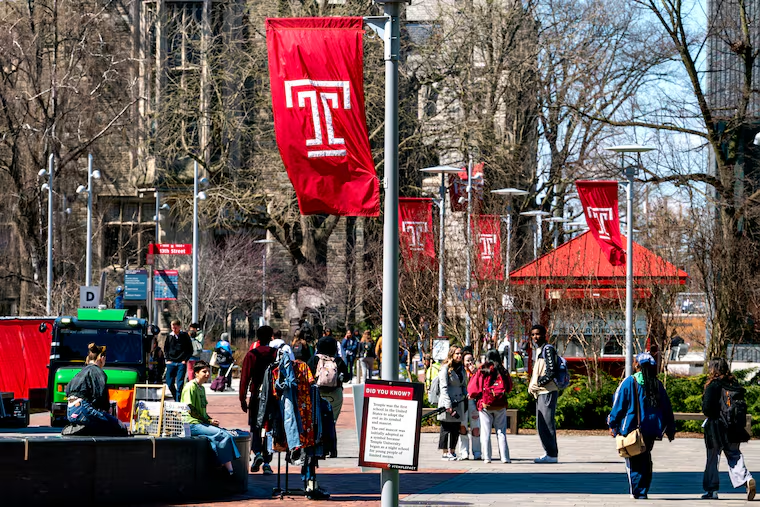After Jason Wingard’s resignation, Temple students want the university’s next president to be more responsive
“Just be more student-oriented. Actually go through with what you say you’re going to do,” said 19-year-old Matt Grande.

After news broke on Tuesday that Temple University president Jason Wingard had resigned, Temple students have felt a mix of emotions: some surprise, some expectance, some indifference. None of the students interviewed for this story felt particularly happy or upset about Wingard’s departure after less than two years, though. They just want to see a difference in their lives on campus.
“I’m kind of shocked,” said Michaida Jean, 20. “I thought at least he would stay and try to make some type of change.”
When asked about Wingard’s tenure and where his leadership had fallen short, Temple students overwhelmingly pointed to their safety.
“I thought at least he would stay and try to make some type of change.”
And while gun violence and crime in Temple’s North Philly neighborhood have weighed heavily on students since well before Wingard became president, the killings of Temple Police Officer Christopher Fitzgerald last month and of Temple student Samuel Collington in 2021 were shocking and traumatic.
“When I first started [here] compared to now, safety has gotten worse,” said Salvi Patel, 23. “Now, I would not go alone [past] 15th Street.”
Matthew Melhuish, 19, said that it’s been hard to trust Wingard’s past assertions that students are safe even while on campus. Last week, Melhuish was playing softball on a Temple field and said he heard over a dozen gunshots nearby. “Is this really safe?” he said.
» READ MORE: After a tumultuous tenure, Jason Wingard has resigned as Temple University president
In a survey conducted by the Temple News of about 1,000 students earlier this month, 75% of respondents said that safety was Temple’s biggest issue. And while Wingard promised to add additional police officers, the university has struggled to meet its hiring goals.
Several students believed that Wingard was not entirely to blame for their lack of safety, though. They acknowledged that Philadelphia’s violence is widespread, and that a university president doesn’t have complete power over some of the larger societal factors that lead to violence.
“Him resigning is not going to fix the issues we are currently facing.”
“Him resigning is not going to fix the issues we are currently facing, like having a sense of security,” said Jay Jay Despagne, 23. “It’s not like I expect the president to be patrolling the streets.”
“What’s going on is the city we live in. It’s unfortunate that Temple is here in the middle of chaos,” said Jean.
The students said they believe that any president could have experienced similar high-profile incidents of violence under their leadership.
“No matter who you are, this is a very hard area to come and be a president and fix things quickly,” said Melhuish.
» READ MORE: After an officer’s death, the community around Temple is feeling the weight of ongoing gun violence
The other prominent issue Wingard faced as president was the 42-day strike by the university’s graduate student union. It was a significant disruption for undergrad students; some of their classes went online as the university replaced their striking instructors, and protests disrupted daily life on campus.
“It was a pain in the ass,” said Matt Grande, 19, bluntly. “I think that could have been handled a lot better,” he said about the university’s dealing with the union, whose demands included pay increases and expanded health benefits.
Casey Johnson, 19, expressed frustration over constantly having to encounter pickets on campus, saying the university needs to have more “respect” for workers.
As Temple begins its search for a new president, students hoped that the university hires someone more committed to building a connection with them. One common criticism of Wingard was that it felt as if he was absent, or that he wasn’t interested enough in hearing their concerns.
“[He’s] not like somebody I really knew,” Despagne said.
A memo from Temple faculty union leadership to its members before a possible vote of no confidence against Wingard said that “Wingard is so rarely seen on campus that both undergrad and graduate students have been utilizing the slogan ‘Where’s Wingard?’ or ‘Where is Jason?’”
The students are not asking for someone who will overhaul the university, or do something unprecedented. They just want a leader they can trust, and a person who sincerely listens.
“What makes people feel unsafe is their concerns aren’t listened to and the problems continue,” said Adenike Onanuga, 19.
Grande has this suggestion for whoever leads Temple next:
“Just be more student-oriented. Actually go through with what you say you’re going to do.
“Back up your words with action.”